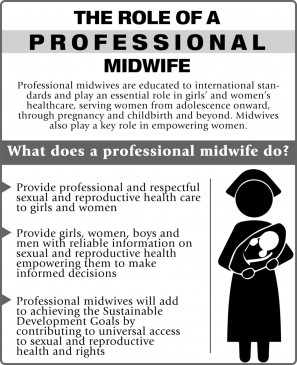Professional midwives ensure rights of women and girls
Professional midwives are globally recognized as experts on sexual and reproductive and as champions of rights of women and girls. Professional midwives combine ancient traditions of advocating for, and nurturing women, with modern science and technology.
A substantial drop in maternal mortality ratio was possible through integrating professional midwives into the national health system.
However, women from poor, marginalized communities, and those living in remote locations, reproductive health related morbidity and mortality still remains a serious challenge.
Patriarchal norms and low prioritization of rights of girls and women have detrimental effects on social and health outcomes. Such outcomes include child marriage, gender based violence, limited access to health care and skilled birth attendants, lack of emergency obstetric and maternity care, denial of right to family planning as well as gaps in educational attainment.
Currently, through many projects by the government and non-government organizations and the continuum of care provided by professional midwives, midwifery has become a mode of strengthening the rights of women and girls.
The infographic below provides further details:

Women and girls receiving midwifery services are empowered through the provision of information and access to compassionate care.
The knowledge and awareness midwives can provide to girls and women will contribute towards greater control over their fertility, better health seeking behavior, satisfying child birth experience and overall improved reproductive health.
The establishment of the midwifery cadre has also opened up a new career path for girls in Bangladesh. Currently professional opportunities for midwives exist in government, NGO, private service and even as an entrepreneur. A respected midwifery profession will attract talented and ambitious young people who are committed to empowering women by improving the quality of sexual and reproductive health care.
Together with the Bangladesh Midwifery Society, UNFPA has started reaching out to girls in secondary schools to raise awareness for the profession and its potentials. With international partners including Sweden, the UK and Canada new opportunities are being established allowing midwives to pursue master degrees in sexual and reproductive health and enabling them in future to ascend to higher level academic and clinical posts in the public and private sectors.
Midwives can provide optimum services only when they are given a conducive working environment. Unfortunately, global experience reveals that too often midwives, as women caring for women, face effects of the same entrenched patriarchal values that affect all women. Midwives risk facing low and irregular pay, harassment and disrespect, and a limited enabling environment.
By empowering midwives and enabling them to be part of decision- and policy-making processes in the field of sexual and reproductive health, important insights can be gained and women’s needs can be better taken into account.
The International Confederation of Midwives (ICM) has called on governments to globally recognize and support accessible and effective midwifery care as a basic human right for all women, babies and midwives.
Bangladesh has already taken the first steps in realizing this goal but more can be done to accelerate progress. An opportunity exists for Bangladesh to demonstrate its fullest commitment to the rights of girls and women by ensuring the success of the midwifery profession.
Source: The Daily Star

